- Home
- Alex Archer
The Lost Scrolls Page 2
The Lost Scrolls Read online
Page 2
"I know you!" she exclaimed. "I have seen you on Chasing History's Monsters."
"Well, yes, I appear on the show from time to time," Annja said with authentic modesty. She did not want to be known primarily for her association with the program. Especially among peers as distinguished as these.
"You are the woman they bring on when they wish to cover something up," the girl went on, voice rising accusatorily, "and undo all the good work done by poor Kristie Chatham!"
Chapter 2
"They despised everything but virtue," Annja read, the bubbly water, still hot, gurgling to the slight motions of her body as she kept the book braced open against her drawn-up knees.
Photographic specialist Rahim al-Haj had lent her a copy of Plato's Dialogues, well grimed and dog-eared by the team, as she took her leave of the recovery site late that afternoon. Unwinding in her hotel room after dinner in one of her favorite fashions, she was reading what Plato had written about Atlantis.
The legend claimed there had been an island outside the Pillars of Heracles, "larger than Libya and Asia put together." Whatever Plato meant by Asia. A big island, to be sure.
The Atlanteans, the story said, made war on Europe. The Athenians, eventually standing alone, had defeated them. Then violent earthquakes had occurred, followed by floods. In a single day and night the island of Atlantis and all its people disappeared in the depths of the sea. That sounded pretty final to Annja. It did intrigue her that the Athenians apparently suffered greatly from the same catastrophe.
"You never hear that part of the myth when people talk about Atlantis," she said aloud.
There was a lot of discussion about the founding of Athens. It intrigued Annja to read of what seemed to her to be an equality of men and women in ancient Athens, including in warfare. She was also struck by the claim that Greece had once been a wonderfully green and fertile peninsula that had suffered sorely from millennia of soil erosion. She wondered if there might be something to that part, anyway.
At last the narrative wandered around to Atlantis. It had been built by the sea god Poseidon to impress his human love, Cleito. It was a land of fertile fields, concentric circles of canals, elephants, that sort of thing. She made note of several details to take up with her hosts in the morning.
What made the biggest impression on her was the interval of nine thousand years since the supposed fall of Atlantis. She put her book up on the rim of the sink and closed her eyes and tried to wrap her mind around it.
As someone who had studied geology, and a bit of paleontology, as part of her formal education, she had little trouble coping with nine millennia. In geologic terms it was a fraction of a second.
But for a coherent account of events to survive for nine thousand years – for any kind of knowledge to be transmitted over such a yawning gulf of time – that just made her jaw sag in disbelief.
She was well aware that archeology, especially the relatively new but fruitful practice of applying modern forensic techniques to archeological evidence, was showing that as often as not the written histories bore only a passing resemblance to what could be physically demonstrated to have really happened. History was perhaps not bunk – not altogether. But to say it was inexact was like saying it snows at the North Pole.
Could any meaningful, let alone accurate, information be transmitted over nine thousand years? She doubted it.
And yet...the legend of Atlantis had persisted all that time. It had exercised a fascination on the human imagination continuously since Plato had recorded it. Does that count for something?
She shook her head. Weariness was getting the better of her. She'd been going pretty hard of late, to say the least. She stood up with a slog of water and a cascade of soapy foam down her long smooth body and legs, and drew the curtain around the tub to shower off before heading to bed.
It was late at night. Annja had spent the day down in the excavation itself, painstakingly helping to extract burned scrolls from the rubble of the burned cabinets. She was exhausted and felt sticky from sweat, although here in the main lab inside the old warehouse it was quite cool. Apparently the Supreme Council on Antiquities was willing to spring for air-conditioning. Or maybe the television network was springing for it – she was grateful to whomever.
She noticed Jadzia lurking off to one side. The girl was fanning herself with a sheaf of fanfolded paper and trying to chat up a handsome young Egyptian technician working on a computer near her. Either he was shy or deliberately ignoring her. She caught Annja's attention, glared and looked away.
"Correct me if I'm wrong," Annja said, propping her rump on a table. "Wasn't the Minoan civilization destroyed by a great big volcanic eruption around 1500 B.C.?"
"Yes," Pilitowski said. "The catastrophic eruption of Thera. It is now estimated to have been at least ten times as powerful as Krakatau in 1883."
"Although geologists tend to date the eruption from about 1600 B.C.," Aleksy Fabiszak, the team's geology specialist, said. "That volume of ejecta would be the same magnitude as the terrible Tambora eruption of 1815, the most violent of recorded history."
"One point on the volcanic explosivity scale beneath supervolcano," Maria said.
"So it would have made a royal mess of much of the Aegean," Annja said. "I mean, the way the catastrophe that destroyed Atlantis is supposed to have?"
"Well, if what you're getting at is that perhaps Atlantis and the Minoan culture of Crete were the same," Pilitowski said, "a lot of people have come to suspect that."
Jadzia snapped her gum loudly. " Somebody should tell her," she said brassily, as if Annja were not in the room, "that we have found many references on the scrolls that make it impossible the writer was talking about the Minoans."
Burly, good-natured Dr. Pilitowski looked to the slight, dark Maria, who shrugged. Annja got the impression she wasn't the only one who found the brilliant language expert a problem child.
"From contextual evidence in what we have translated of these Atlantis scrolls," Maria said, "it is clear they were written about half a century after Solon. That would make them a century older than Plato's writing."
"So far we are not finding any reference to Solon at all," Naser said. He was a plump, pallid man in his thirties with a neat beard, who spoke with a Lower East Side New York accent. "We suspect that somewhere along the line different end-of-the-world stories got mixed together."
"Hmm," Annja said. She was still having trouble dealing with serious archaeologists taking Atlantis seriously. Although she had to admit none of them actually seemed to be vested in the truth of the scrolls, even if they did call them the Atlantis scrolls. But there was no mistaking the excitement that ran through the site whenever the gong went off to announce that they had images of more restored fragments.
"One thing I'm puzzled by," she said, "is that reading Plato, I didn't really see any talk about advanced technology. Not like what people always talk about, with flying machines and artificial light and all that."
"That actually seems to have first appeared in a book called A Dweller on Two Planets, which came out late in the nineteenth century," Pilitowski said. "Its author claimed to have received the information in dreams."
Annja raised an eyebrow.
"Well, channeled it, actually." He shrugged. "What can I say? He was from California."
"Somebody ought to tell her the new scrolls substantiate much of what Frederick Oliver wrote in that book," Jadzia said hotly.
Annja looked to Pilitowski, who shrugged. "I do not know that I would go so far as to say 'substantiate,'" he said. "Nonetheless, we must admit we find certain correspondences."
"We began to wonder if some alternate account of Atlantis might have surfaced sporadically throughout history," Naser said, "without impinging on academic scholarship. And that Oliver got hold of it somehow."
"With all respect," Annja said, "that seems to be reaching a bit far."
"Not so far as believing in channeling," Naser said.
"Tru
e," Annja said with a laugh.
Annja looked sidelong at Jadzia. The young woman – she just acts like a girl, Annja thought – posed a conundrum. For one thing, Annja wasn't used to evoking knee-jerk hostility in people she hadn't met. It bothered her. She led an isolated enough existence that she felt threatened when somebody reacted to her with such vehement negativity, as if perhaps she had at last been found out as invalid and unworthy for human companionship.
For all her rigorous training in cryptology, which Annja knew was no soft science, involving some of the most abstruse and demanding maths around, Jadzia clung to the role of true believer in Atlantis mysteries and doubtless a thousand other conspiracy theories. She wasn't the first person Annja had bumped up against who harbored both serious scientific credentials and crackpot beliefs. She sometimes suspected that really high-level scientists could only be expected to be sane and knowledgeable in their own field of expertise, and anything else was fair game.
So maybe Jadzia's hostility arose from antipathy toward the role Annja played, authentically enough, of house skeptic and counterpoint to Kristie Chatham, who believed in everything.
Annja had certainly suffered many flame attacks from such antifans before she quit visiting the show's message boards, despite the insistent entreaties of her producer, Doug Morrell, that she do so. But that virulence didn't spill out of cyberspace into her lap.
She suddenly remembered something odd said in passing the day before. "Why do they call Jadzia the anticomputer geek?" she asked Maria. Very softly, she thought.
But apparently among Jadzia's attributes was a very keen sense of hearing. "I kill computers," she announced proudly, her voice sharp edged.
"How?" Annja asked. "With a sledgehammer?"
She hadn't meant to say that – really. But instead of flaring up at the comment, or the laughter it evoked from the eight or so other team members in the large room, Jadzia laughed louder and more brazenly than the others.
"Just by touching," she said proudly.
Annja cocked an eyebrow at Pilitowski, who shrugged a big sloped shoulder. "It is true," he said. "We cannot let her handle anything electronic. In seconds – " he snapped his fingers " – pfft!"
"It has to do with my personal magnetic field," Jadzia said. She wore schoolgirl blue and white, with knee-high white stockings instead of the thigh-highs she'd had on the day before. Her skirt wasn't any longer. "It disrupts electronic devices."
"I don't buy that," Annja said. "Things like that don't happen in the real world."
"Lend me your cell phone?" the blond woman purred.
The gong sounded so loudly Annja jumped.
Only two of the team members were on duty down in the current excavation – a short, stocky Polish man named Tadeusz and a willowy Egyptian woman a head taller named Haditha, who wore what looked like a ruby in her pierced left nostril. The pair had trouble communicating verbally, since neither's English was the strongest. Haditha spoke beautiful French. Tadeusz was a bit hard of hearing into the bargain. Yet they worked well together, seeming to have evolved some brand of nonverbal communication.
Everyone tacitly assumed they were sleeping together, although they never seemed to seek each other out off-hours. The consensus held that this was a cunning pose. Annja, knowing what a hotbed of intrigue and gossip the best-ordered dig could turn into after only a couple of weeks, reserved judgment. Like everyone else archaeologists loved a good story, and were reluctant to let facts spoil it – outside their chosen area of expertise, of course.
They came out of the bubble tent on the run. A few bright lights shone randomly from the nearby buildings, casting jagged patterns of light and shadow across the demolition rubble. As they went in the door of the former warehouse, Haditha heard a peculiar double cough from behind. The noises had an edge, reminiscent of knuckles on hardwood.
Tadeusz pitched forward on his face on the floor beside her. She stared at him in astonishment. The back of his pale head was stained dark and wet.
Chapter 3
A sound behind Haditha made her turn. She gasped at a black insectile figure looming over her.
The man in the night-vision goggles and blackout gear stuck the thick muzzle of his sound-suppressed machine pistol against her sternum and fired the same precise 2-round burst his partner had used on the Polish archaeologist an instant before. Haditha recoiled, then simply collapsed, her dark almond eyes rolling up in her head.
From high above and in front of the black-clad pair came small muffled crashes, themselves hardly louder than coughs. Shards of glass descended from above, swooping like falling leaves, breaking to smaller pieces on the black rubber runner that ran along the central aisle. More black-clad figures rappelled from the broken skylights.
With a frown Annja snapped her head up from where she leaned close to the big flat-screen monitor. "What was that noise?"
Most of the team members ignored her. A number of new images were coming in from scrolls shipped intact to the jet propulsion laboratory, where layered MRI scans were used to extract the writing from within the rolled papyri.
A couple of the Egyptian team members murmured briefly in Arabic.
"Probably just some homeless," Naser said.
However, Ismail, who had just come in, turned and started back out the door into the darkened aisle.
"Wait!" Annja heard him cry in English. "You cannot come in here!"
She heard two sounds like blows of a distant tack hammer.
Through the use of handheld terahertz radar units, which enabled them to see right through walls, the raiders knew precisely where every member of the Polish-Egyptian dig team was located.
As more of their fellows dropped in, the pair who had taken down the first two targets spread out to secure the entryway. The rest slipped in quick, silent pairs into the side cubicles. More double thumps sounded as they cleared them.
The Nomex-clad raiders in their goggles and face masks knew there was no escape from the large room at the end of the aisle. The big windows throughout the structure had all been bricked shut long ago.
It would be the perfect killing floor.
"Get down!" Annja shouted.
Recent experience had brought her to the conclusion that people dressed in black Nomex and masks and carrying automatic weapons were not in a state of mind to be reasoned with.
Jadzia was already in motion, grabbing the blackened-log papyri from the table and stuffing them in a large lime-green-and-purple gym bag that was used to ferry bagged artifacts.
Ismail staggered a step back into the lab. Then he rallied and lurched forward to stand with arms braced in the door. He called something defiant sounding in Arabic that ended in an agonized cough.
Annja circled rapidly to her right. She knew they were trapped. Her only hope of saving any of the team from the attack she already knew was in progress was to get out of the immediate line of fire and hope to ambush intruders as they entered.
They were too far ahead of her.
Ismail reeled into a table and spun, the front of his shirt and white coat seemingly tie-dyed in florets of red. He pitched onto his face as a pair of men in black stepped through the door and then to opposite sides. They held 2-round machine pistols to their shoulders.
The one to Annja's left fired a two-shot burst into Szczepan Pilitowski from six feet away. The big archaeologist fell heavily. The other aimed at Annja. She had already reversed and was racing toward the far end of the room. Bullets knocked masonry dust from the raw wall behind her. The ricochets moaned like restless ghosts.
Another black-clad killer appeared firing in the doorway as Annja, taking and holding a deep breath, hit Jadzia in a flying tackle and knocked her beyond the end of the long table on which the computers sat. The girl yelped in surprise but had the presence of mind to keep clutching the satchel of scrolls with both hands.
Annja heard bullets punching into computer cases with an almost musical rhythm. The team members screamed or called out hoarsely
as they died. There was no chance. The killers were professional enough to ensure that. They had no means of fighting back and nowhere to flee.
Leaving Jadzia sprawled in the relative shelter between the end of the computer table and a round-topped, bricked-up window in the end wall, Annja sprang up onto the table. The killers were moving into the room, fanning out to hunt down team members trying to hide behind filing cabinets and under tables.
An intruder raised his weapon to Annja. She threw the nearest computer case at him. Power and video cables ripped noisily out from the rear. It struck him in the goggles and knocked him backward against the wall.
Bullets struck the wall near her. She hoisted the accompanying computer monitor end over end at the shooter.
The monitor was not a flat-screen. It was an old-fashioned model and weighed a good forty-five pounds. The man gave up on shooting to raise his hands defensively. Annja heard his ulna snap. The shooter went over backward with a crash.
The other three men opened up on her. Annja dived off the table toward the side wall. Her foot came down on some kind of power converter or adaptor and flew right out from under her. Her head cracked into the wall. Her teeth clacked painfully. Red sparks flew behind her eyes.
"I got her," she heard a man say, his voice muffled by his mask. Head spinning, she found herself on all fours, too dizzy to rise. She raised her head at the man in black aiming the machine pistol at her. The hole in the end looked big enough to swallow her whole.
A figure loomed up behind the black-clad killer. Before the gunman could fire, Szczepan Pilitowski, his wide pale face streaming blood, struck him from behind with a chair.
The two intruders still on their feet opened fire from the far side of the room. Though the suppressed shots sounded relatively loud in the enclosed space, they were not loud enough to mask the hard thumps of the bullets hitting the big archaeologist's soft body. He roared in defiance, turning toward them. Then his legs gave way. He fell to the floor with a slapping sound.

 Rogue Angel: Forbidden City
Rogue Angel: Forbidden City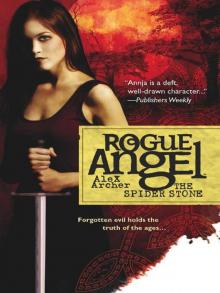 The Spider Stone
The Spider Stone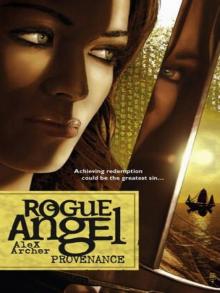 Provenance
Provenance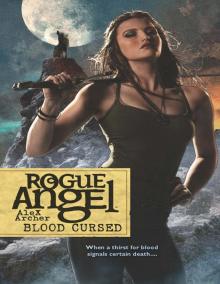 Blood Cursed
Blood Cursed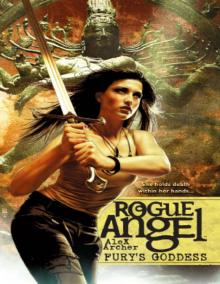 Fury's Goddess
Fury's Goddess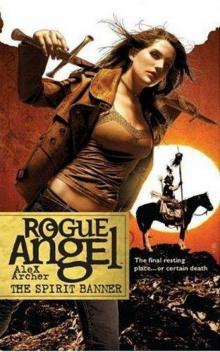 The Spirit Banner
The Spirit Banner Footprints
Footprints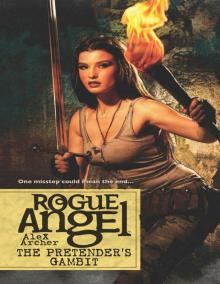 The Pretender's Gambit
The Pretender's Gambit Rogue Angel: The Lost Scrolls
Rogue Angel: The Lost Scrolls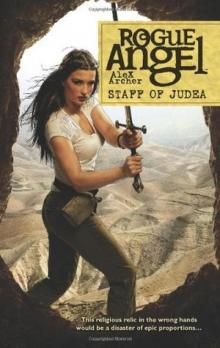 Staff of Judea
Staff of Judea Rogue Angel 55: Beneath Still Waters
Rogue Angel 55: Beneath Still Waters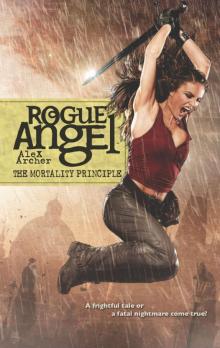 The Mortality Principle
The Mortality Principle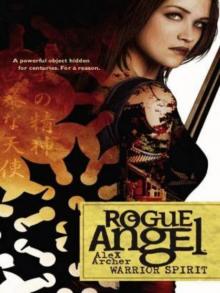 Warrior Spirit
Warrior Spirit Paradox
Paradox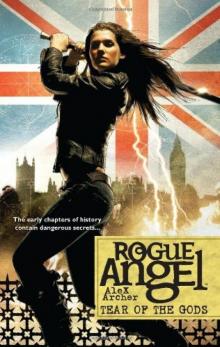 Tear of the Gods
Tear of the Gods Forbidden City
Forbidden City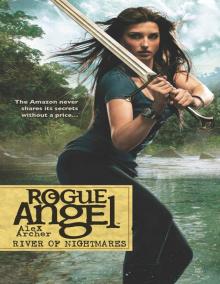 River of Nightmares (Rogue Angel)
River of Nightmares (Rogue Angel)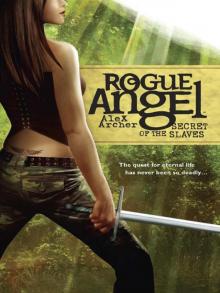 Rogue Angel: The Secret of the Slaves
Rogue Angel: The Secret of the Slaves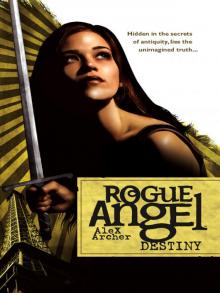 Destiny
Destiny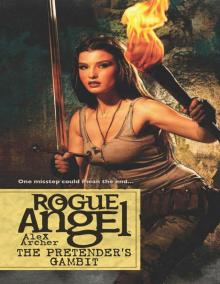 Rogue Angel 51: The Pretender's Gambit
Rogue Angel 51: The Pretender's Gambit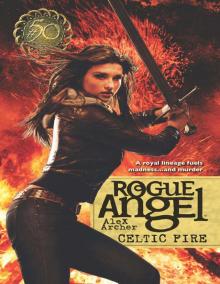 Celtic Fire
Celtic Fire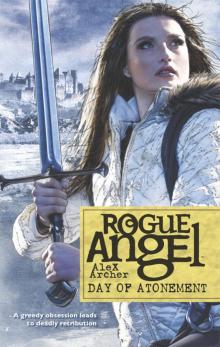 Rogue Angel 54: Day of Atonement
Rogue Angel 54: Day of Atonement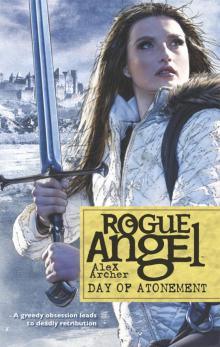 Day of Atonement
Day of Atonement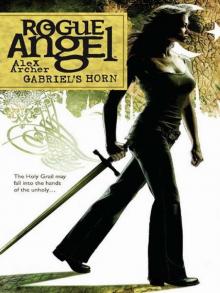 Rogue Angel: Gabriel's Horn
Rogue Angel: Gabriel's Horn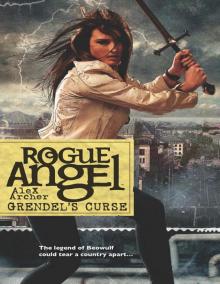 Grendel's Curse
Grendel's Curse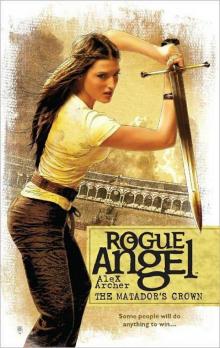 The Matador's Crown
The Matador's Crown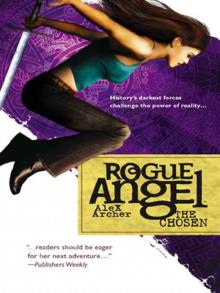 Rogue Angel: The Chosen
Rogue Angel: The Chosen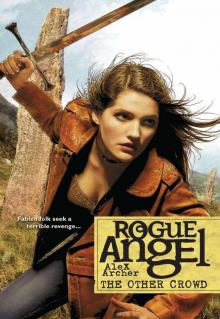 The Other Crowd
The Other Crowd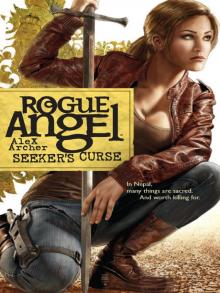 Seeker’s Curse
Seeker’s Curse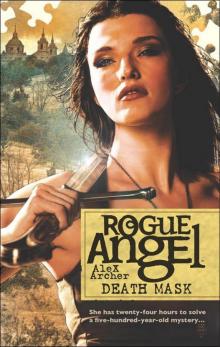 Rogue Angel 52: Death Mask
Rogue Angel 52: Death Mask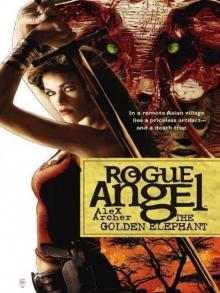 The Golden Elephant
The Golden Elephant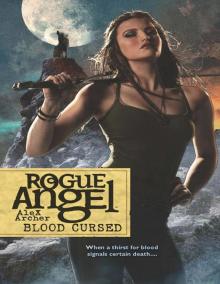 Blood Cursed (Rogue Angel)
Blood Cursed (Rogue Angel)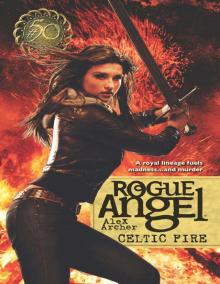 Celtic Fire (Rogue Angel)
Celtic Fire (Rogue Angel)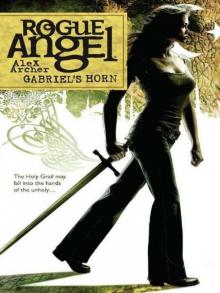 Gabriel's Horn
Gabriel's Horn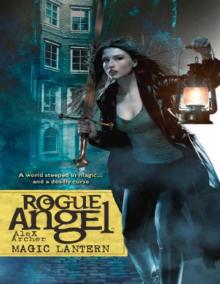 Magic Lantern (Rogue Angel)
Magic Lantern (Rogue Angel)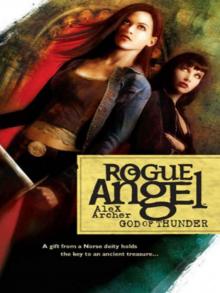 God of Thunder
God of Thunder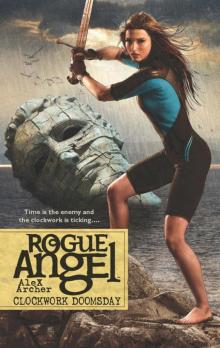 Clockwork Doomsday
Clockwork Doomsday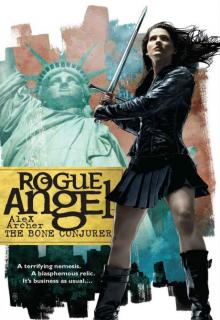 The Bone Conjurer
The Bone Conjurer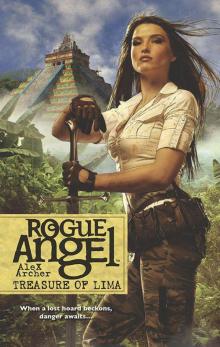 Treasure of Lima
Treasure of Lima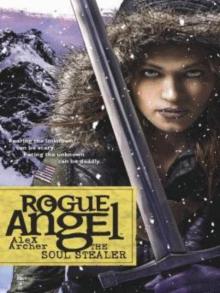 The Soul Stealer
The Soul Stealer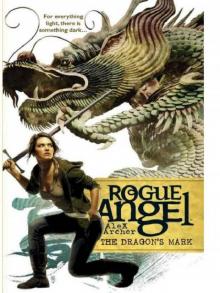 The Dragon’s Mark
The Dragon’s Mark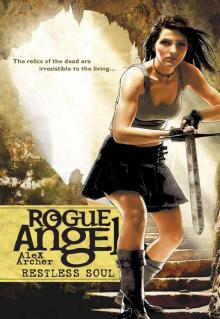 Restless Soul
Restless Soul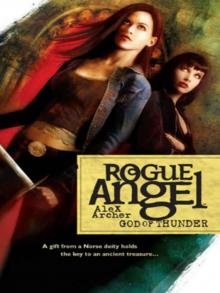 Rogue Angel: God Of Thunder
Rogue Angel: God Of Thunder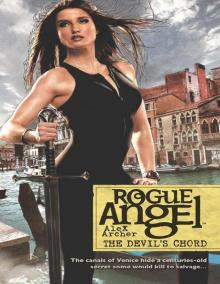 Rogue Angel 49: The Devil's Chord
Rogue Angel 49: The Devil's Chord Death Mask
Death Mask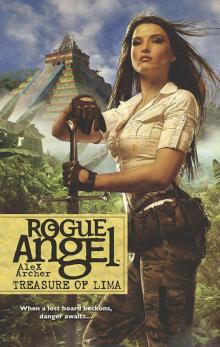 Rogue Angel 46: Treasure of Lima
Rogue Angel 46: Treasure of Lima Swordsman's Legacy
Swordsman's Legacy The Oracle's Message
The Oracle's Message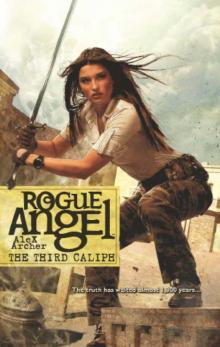 The Third Caliph
The Third Caliph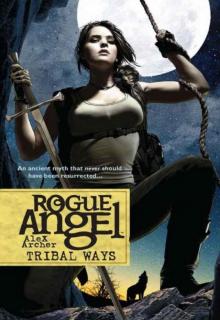 Tribal Ways
Tribal Ways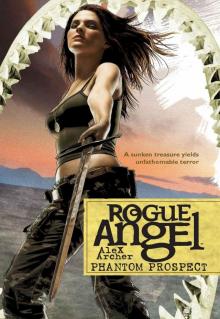 Phantom Prospect
Phantom Prospect Rogue Angel 50: Celtic Fire
Rogue Angel 50: Celtic Fire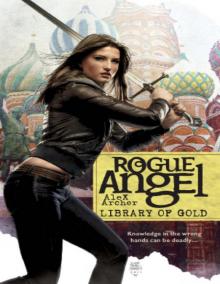 Library of Gold
Library of Gold Rogue Angel 53: Bathed in Blood
Rogue Angel 53: Bathed in Blood Sacred Ground
Sacred Ground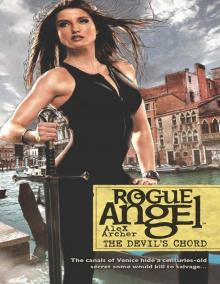 The Devil's Chord
The Devil's Chord Serpent's Kiss
Serpent's Kiss The Vanishing Tribe
The Vanishing Tribe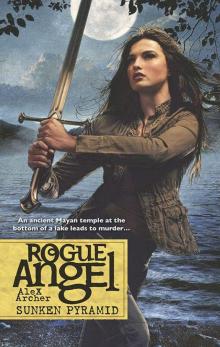 Sunken Pyramid
Sunken Pyramid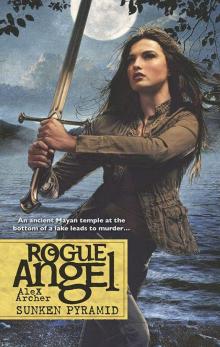 Sunken Pyramid (Rogue Angel)
Sunken Pyramid (Rogue Angel)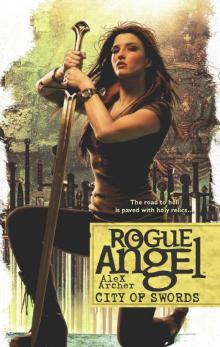 City of Swords
City of Swords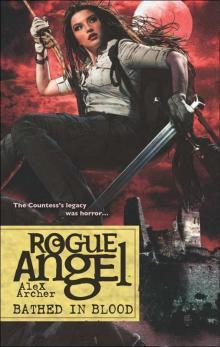 Bathed in Blood
Bathed in Blood The Lost Scrolls
The Lost Scrolls The Babel Codex
The Babel Codex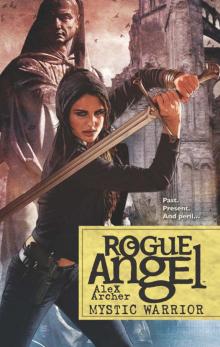 Mystic Warrior
Mystic Warrior Eternal Journey
Eternal Journey Beneath Still Waters
Beneath Still Waters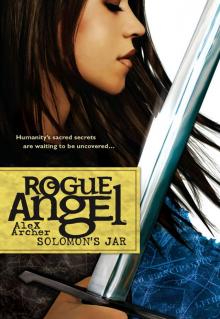 Solomon's Jar
Solomon's Jar Beneath Still Waters (Rogue Angel Book 55)
Beneath Still Waters (Rogue Angel Book 55) Cradle of Solitude
Cradle of Solitude Secret of the Slaves
Secret of the Slaves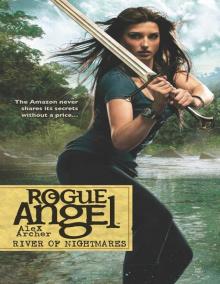 River of Nightmares
River of Nightmares Polar Quest
Polar Quest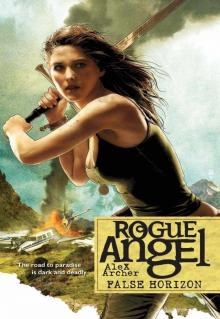 False Horizon
False Horizon